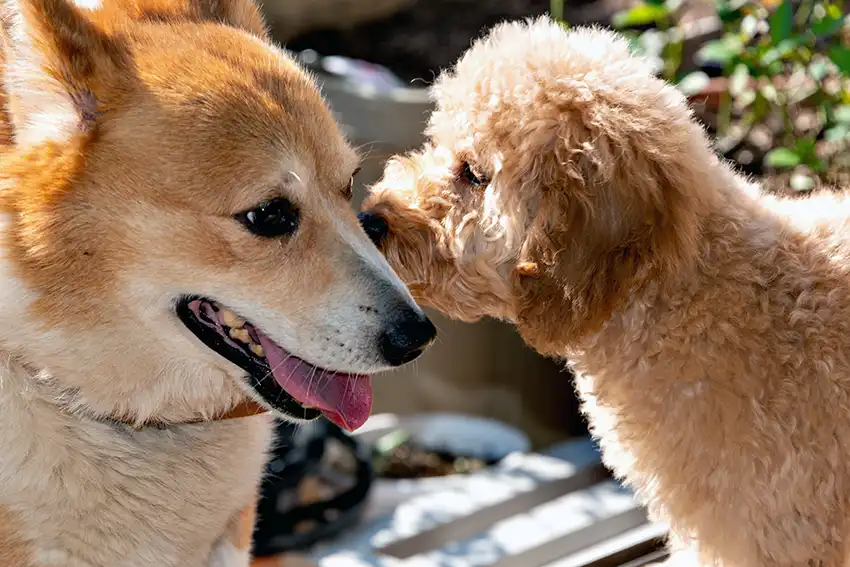The Pembroke Welsh Corgi is an adorable, agreeable small dog whose size conceals generations of herding instincts and traits associated with much larger breeds. Ranked as the smallest dog in its herding group, the Corgi is an intelligent, tenacious, family-friendly dog that is equally loving and dependable too.
History
Some find it hard to believe that a dog the size of the Pembroke Welsh Corgi was bred for herding cattle, but its deeply entrenched instincts go back centuries. It is believed that the cattle dogs that were brought to Wales by the Vikings in the 9th and 10th centuries, are the true ancestors of the Corgi that we know and love today. However, it is also possible that they may have descended from a line of dogs that were brought to Wales in the 12th century by Flemish weavers.
Corgis possess all the vital traits to be extremely efficient cattle dogs, such as tenacity, determination, and high intelligence. Both the Pembroke and its close cousin, the Cardigan Welsh Corgi, descend from the line of northern spitz-type dogs. Initially recognized as one breed, the UK Kennel Club decided in 1934 to recognize the Pembroke and Cardigan separately. The American Kennel Club followed suit in the same year and in 1936, the Pembroke Corgi was first shown in the USA.
The Pembroke Welsh Corgi is perhaps best known for being, the late, Her Majesty Queen Elizabeth II preferred breed of dog. As a young princess, Elizabeth was given her first Corgi by her father, King George VI, in 1933, and the breed became a fixture in her life, and the Royal Family, ever since.

Physical Characteristics
Muscular, long, and low set, the Pembroke Welsh Corgi differs from its cousin, the Cardigan Welsh Corgi. The Pembroke typically has docked tails compared to long tails for Cardigan, however, this practice has been banned in the UK for cosmetic reasons, which makes it more difficult to spot. Additionally, the Cardigan has a slightly larger head and comes in different colours than its Pembroke counterpart.
Personality and Temperament
Pembroke Corgis are highly intelligent, outgoing, and friendly dogs. Strong and athletic, Corgis are happiest with moderate daily exercise and they especially love herding and chasing, the same activities they engage in as working dogs. Their pleasant disposition makes Corgis a great fit for families, and their protectiveness if they sense a threat to their family makes the breed great watchdogs. However, their determination can sometimes turn into a stubborn streak, making early, consistent training beneficial to avoid future behaviour problems.
Corgis have become more and more popular over the years, and for good reason. They are great family dogs, with keen intelligence which means they take well to training. This same intelligence can be a challenge for their owners, as Corgis do not relinquish leadership roles easily. After all, the same determination, tenacity, and independence that served them well as herding dogs can also make them a challenge to own.
If you are thinking of purchasing a Corgi, it is especially important to source from a responsible breeder who is breeding not only for looks, but health and temperament too.
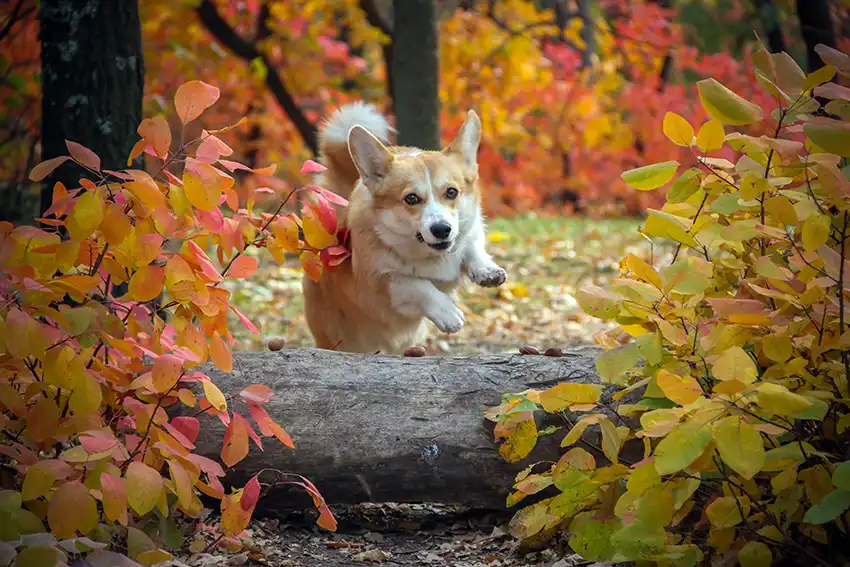
Health
Corgis need daily exercise to stay healthy and happy. Consider walks or jogs, but be mindful of their short legs, which can hinder their ability to keep up at faster speeds. Corgis are very intelligent and need mental stimulation.
Everyday Illnesses and Injuries
Your Corgi's health concerns will change over the course of their life. A puppy might be more prone to eat something they shouldn't, a 2-year-old Corgi may be more likely to develop allergies, and a senior Corgi is far more likely to develop arthritis as they age. Corgis also have personality and physical traits that may make them more prone to certain conditions. An active Corgi that loves to run around and jump on furniture may be more prone to hip and leg problems.
If you are ever concerned about your dog's health, your local veterinarian is a great resource.
Genetic Health Concerns
Like many popular breeds, the Corgi has its fair share of hereditary based problems, such as knee, hip and elbow dysplasia. Most reputable breeders now have their breeding stock checked and scored by a vet for these hereditary ailments. You can request proof that the puppy you are purchasing comes from parents that have been checked for these issues.
Many other health issues are also hereditary, so we recommend you do some research on the ancestry of your puppy and any health issues of that particular breed.
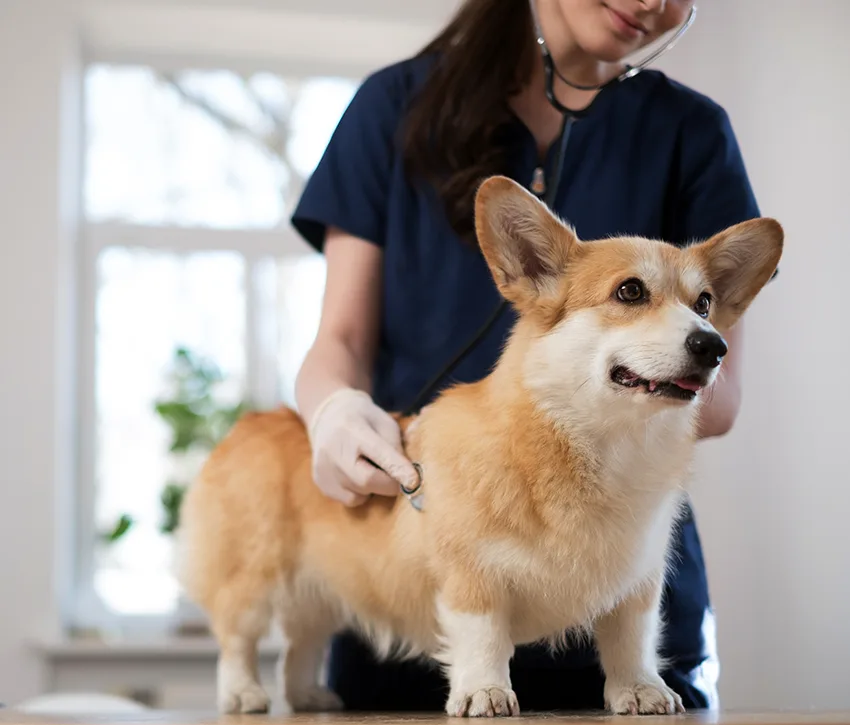
Preparing Yourself
As a pet owner, you should expect to pay for basic veterinary care like vaccines, spay / neuter, and annual checkups. Many pet owners don't consider the unexpected illnesses and injuries that can occur throughout a pet's life and fail to prepare for them. Medical insurance can help a pet owner prepare and lessen unexpected bill in later life. As with most insurance you pay a monthly premium to be covered for eligible veterinary expenses. Every provider is different, offering varied coverage with different plans, pricing options and limitations. As you do your research, pay close attention to coverage, deductible options, ease of use, and if pre-existing conditions are covered.
Grooming
Corgis possess a weatherproof short undercoat with a longer, coarser outer coat of varying length. Pembroke Corgis do benefit from daily brushing to minimise their tendency to shed, which increases in spring and early summer. It is recommended to occasional bath to loosen dead hairs, though Corgis should be completely dry before brushing. We also recommend regular nail trimmings and routine ear checks too.

Common Behaviour Problems
Corgi common behaviour problems are normally barking, chasing, pulling on the lead and sibling rivalry. They can be bossy with other dogs, with a desire to rule the roost. Early training makes a great difference when it comes to managing the strong herding instincts they possess, as the strong headedness often transfers to everything they do. Good management is especially important around young children, who may be nipped during overexuberant play. Without strong leadership the Corgi can get itself into trouble if left on its own to rule the roost
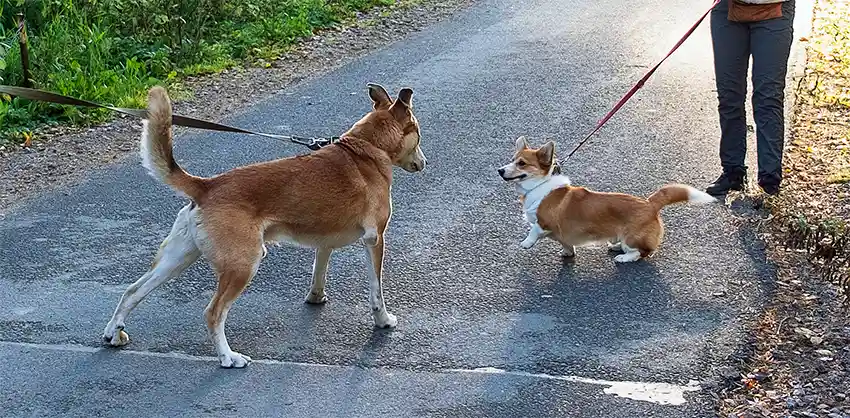
Corgis have never been known to walk away from a fight, but they generally won't start one. It is important to socialise them properly from an early age to avoid behaviour problems with other dogs and people.
Aggression is not normally an issue with Corgis, though they can become lead-reactive if allowed to pull ahead and take the lead on walks. Early training can also help curb their natural instinct to nip at heels if they get excited.
Prevention is better than cure and early basic obedience training along with good leadership, goes a long way to ensure your Corgi understands and follows the rules.
All dogs need a special place to call their own and by selecting a place to eat and sleep away from high foot traffic areas of your home, you can set good habits early on in your Corgi's life.
Puppy Selection
There are many places to acquire a puppy where you can be sure you are getting a puppy that has had the proper breeding. Check out your local rescues and shelters because they have some amazing dogs and puppies that are desperate for a forever home.
Check out the local Breed Specific Rescues, animal welfare shelters, RSPCA and Dogs Trust, as they have many great dogs looking for homes too, who through no fault of their own, have ended up being abandoned. These organisations test their dogs for temperament and soundness.
By adopting, you will be helping a dog in need, one that wants nothing more than to be in a loving home. There are too many companion animals euthanised each year and Bark Busters encourages you to visit one first before buying a puppy from a breeder.
When you are selecting a puppy, try to avoid selecting the fearful or over-zealous puppy. If you are at a shelter, consider that the dog might just be traumatised by their surroundings. All those barking dogs cause timid dogs stress and quite often you will see a different dog if you can get the staff to bring him away to a private viewing section for you. Animal Welfare and Rescues do amazing work in trying to save dogs and match breeds to the right owners, so consider that option when looking for a new puppy.
Select the right puppy. One that suits your lifestyle.
Many of our Bark Busters’ trainers volunteer their services at local shelters and rescues to assist in rehabilitating dogs. Bark Busters have saved many thousands of dogs through our volunteer rescue programmes around the world.
If you do decide to go to a breeder, then ensure you view both parents to determine the puppy’s personality and parentage.
View all interaction between the puppies as this will tell you a lot about their personality. Look out for those assertive types if you want a dog that is going to be good family dog that is good with children.
Tips for Bringing a New Puppy Home

Do not bring a puppy home before it has reached 8 weeks of age but preferably 12 weeks. Any earlier and they will miss out on much needed bonding with other puppies and their mother.
Bring your puppy home early in the day to allow time for your puppy to settle into its new home.
Try to bring some bedding home with the scent of the mother dog, scent of other litter mates, or a familiar scent.
Ensure that you know where your puppy will sleep and introduce your puppy to this area during mealtimes.
If you need to leave your puppy alone for a short while, ensure that you address any barking, while hidden close by, without returning to the puppy. Returning every time your puppy demands, will only encourage more barking. Puppies do better if they know you are there nearby and have not deserted them.
Ensure you have the same diet that your puppy was being fed when with its mother. Any diet change must be a gradual one.
Ensure that you puppy proof your house and place anything dangerous out of harm's way, such as electrical cables and poisonous chemicals.
Make sure you provide lots of bathroom breaks. Take your puppy to do its business at least 8 times per day, after sleeping, eating, drinking and any exuberant exercise.
Do I Want One Dog or Two?
We are often asked by prospective dog parents if they should get one or two puppies. We always answer the same way. Get two only if you really want two dogs!
Dogs are pack animals, and they love having company, but the selection of two dogs is something that must be carefully thought through.
Two neutered males can cohabit without too many issues if their doggie parents treat them equally and do not display any favouritism. Unequal treatment is usually behind most Sibling Rivalry cases.
A male and a female of equal energy can also cohabit. This can be the best match, providing that the female and male are equally matched in size. If they are differing sizes, its best that the male is the larger of the two. Make sure that the female is neutered, when appropriate, or problems could occur if a large male tries to mate with a smaller female.
Two females are not always the perfect pair, as females invariably want to rule the household. It won’t be long before they test each other, and some females won't back down. When you have two females in a household, they both might try to be the boss of each other, which can lead to fights.

Toilet Training
Without a doubt, toilet training a puppy has its challenges and can try your patience. You need to be observant and begin as soon as the puppy is home with you. Bark Busters will make sure the process is not stressful for you or your puppy.
When puppies are first born, they relieve themselves in their den, but their mother is there to clean them. Therefore, there is no scent of urine or faeces where the puppies eat, sleep and play. As they get slightly older, they learn to imitate the mother when she goes outside. This way the puppy becomes conditioned to never eliminate in their dens. If you are crate training, you will find that puppies will avoid toileting in their crate at all costs.
Knowing when your puppy is likely to relieve themselves by reading their body language is the key to success.
Have you ever taken a puppy outside for a walk only to find they relieve themselves as soon as they get back indoors? To avoid this, walk the puppy directly to the area you have designated the toileting area. Stand still and stay with the puppy, so they no longer show interest in you. Do not sit down as this will only encourage the puppy to jump on you and forget what they are there for. Praise when they perform. NEVER scold or rub their nose in any mistakes. This is cruel and will teach your puppy to move out of sight or wait until you are not watching.
Your puppy does not possess human logic but will begin to form good habits through structured routines. Positive reinforcement when they do the right thing in the right place is the best and quickest toilet training method.
Four Basic Needs

Let's examine those four basic needs and why your dog needs them to keep it healthy, balanced and content.
Food - diet / nutrition
We promote a diet that is grain free, low in carbohydrates and without any harmful e-numbers, colours and preservatives. Carbohydrates do add energy that the dog needs to burn off and can make an already hyperactive dog more active.
The right diet, grain free and filled with fruits, vegetables and raw meat will have advantages to how your dog will feel, look and act.
If you want to understand why grains can make a dog more energetic, you only need to think of racehorses and how their trainers give them grain to get highly energetic racehorses. Energy in, equals energy out.
Bark Busters dog trainers are not vets or dietitians, so we urge you to do your own research into the best diet for your dog. A diet that you will be comfortable with.
We do however have vast experience of how highly concentrated grain diets effect behaviour and can cause hyperactivity. This is very prominent in Japan, where most dogs are fed high levels of rice in their diet which can adversely affect concentration and focus.
Safety - through leadership and education
All dogs need strong leadership and to know where they fit into the family unit. If they know they have a leader that will make all the decisions, one who is fair and just, they will be happy and content.
On the other hand, if they have no structure in their life, they have inconsistency, and don’t know how things will be from one day to the next, then they will become stressed and may experience health ailments, skin and stomach issues and behaviour problems. Routine and respect must be established. With equal doses of love and structure your dog will feel safe and secure.
Shelter - a place to call their own
Dogs love nothing better than to curl up on the couch or in a place they can call their own, even when there is more than one dog. Most dogs are very sociable, and they will think nothing of all snuggling in together. Provide your dog with its own "den", a place where they can call home, and somewhere they can go to for a bit of peace and quiet. Just make sure their "den" is warm, easy to clean and maintain.
Entertainment - toys & games
A very important part of your dog's four basic needs is their need to have something to do. If we want to avoid our pets becoming bored and destructive, then they need a way to fill their day.
Dogs thrive with physical and mental exercise. Dogs are highly intelligent animals, and they need to keep their brains active as much as their bodies. Entertainment is an important part of their well-being and essential to your dog's overall mental health.
One great toy is the Bark Busters GameChanger® which helps to prevent boredom, stress, and separation anxiety. By filling it with small treats, your dog will have plenty of fun trying to get the treats to dispense.
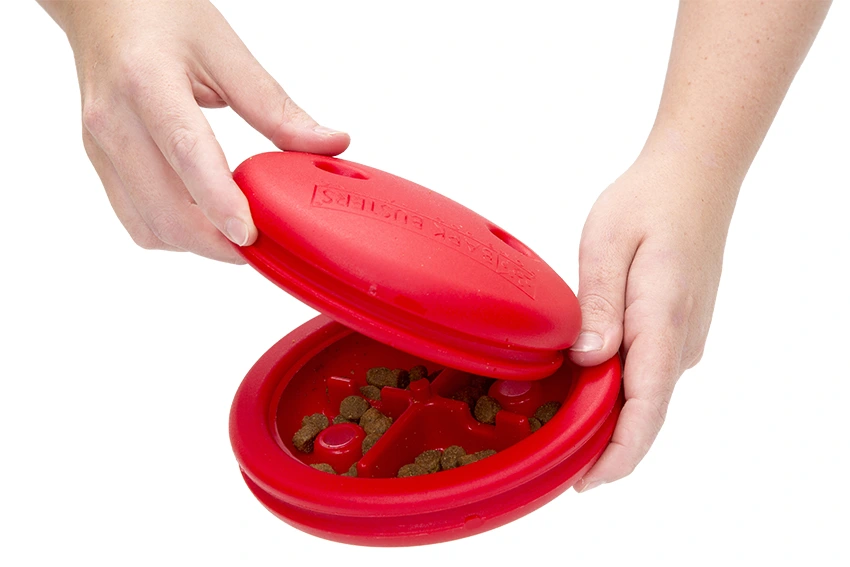
Games to Play
We need be mindful of the games we choose to play with our dogs as we are dealing with canines who can be easily influenced by what we are teaching them to do. For example, a game where you chase your dog is not a good game to play as this only encourages your dog to grab something and run, like your shoe, a precious item, or something breakable.

'Tug of War' is okay and playing ball is good, provided your dog is not the type that gets fixated on the ball and refuses to stop playing when requested. Hide and seek is a great game too. These are games where you hide things from your dog, such as food, toys or a ball and then encourage them to go find it. You can increase the degree of difficulty as your dog gets better at the game.
Hide and seek is a game best played where you have another family member or friend to help you. Start out where your dog sees you hide the toy, then repeat over and over, 'Find' or ‘Seek’. When your dog master this you can then move on to not letting your dog see where you have hidden the item.
Remember to give your dog praise when he finds it. These sorts of games are great entertainment and offer mind exercises for your dog that will tire them as quick as a walk. They are far better than those type of games that encourage your dog to become overexcited or possessive of its toys.
Child's Play
Corgis are usually good with kids, but don't allow the children to turn them into babies or little fur children, as they can become frustrated quite easily and will want to avoid the children.
We don't recommend letting the children pick the dog up as it could get hurt.
Never leave any dog alone with children regardless of the breed, size or personality.
Interactive Play
Bark Busters has the ultimate toy for all dogs that provides dogs with several options. The GameChanger® by Bark Busters is an interactive puzzle toy that delivers a treat. It's a chew toy, that they can carry around and take to their bed. They can't rip it apart like many other toys. It's a workout toy, that they flip over with their nose and scratch it with their paws. The GameChanger® comes in four vibrant colours and will give your dog lots of fun and mental stimulation.
Puppy Selection
The best type of safe socialisation for your Corgi puppy is with dog owners you know have a friendly dog. One that is sensible and not intimidating towards puppies. Some dogs won’t tolerate a lively puppy that jumps all over them, and they may try to put the insubordinate puppy in its place.
This interaction quickly solves the problem but leaves an ever-lasting impression; one that can manifest into dog aggression.
Avoid taking your puppy to a dog park or local park where there will be lots of dogs. Instead start by introducing your puppy to only one or two dogs in a controlled manner. Be sure to control your puppy’s over-exuberance too or fights and scuffles could breakout.
The Wrong Kind of Socialisation
Many new puppy parents cannot wait to take their new puppy out in public or straight to the park to meet lots of other dogs. This is where some of the seeds of misbehaviours are sown. Bark Busters get to see the results of how these hasty decisions can cause fear and dog aggression problems.
Some older dogs or puppies can be intimidating which is possibly going to frighten an inexperienced puppy and possibly cause it long-term behaviour problems, which can turn to late onset aggression towards other dogs. Be selective of which dog you choose to play and socialise with for your puppy.
Dog Parks
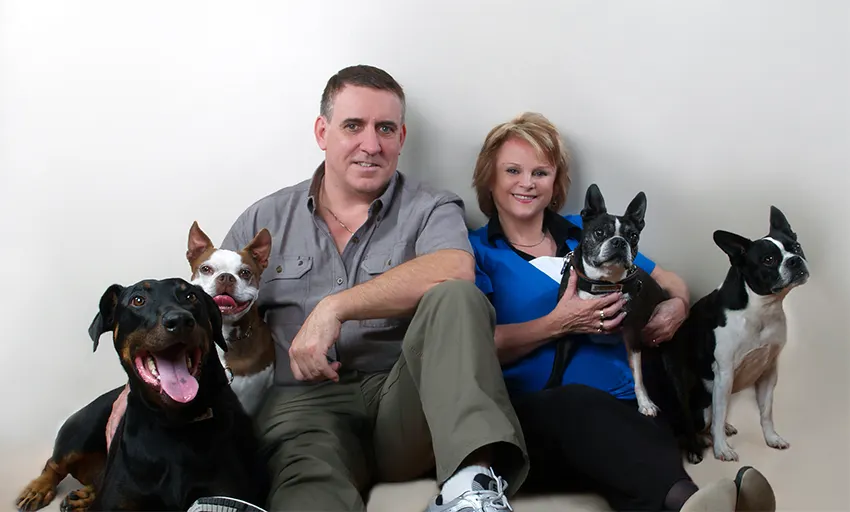
Danny and Sylvia Wilson, Founders of Bark Busters
Taking Your Corgi to Dog Parks
Dog Parks are one of the most misunderstood dog activities of the modern-day dog world. Some doggie parents love nothing more than to take their dog to a dog park. They have been told they need to socialise their dog and so off they go.
They love the fact that their dog has fun, they get to meet other dog lovers and watch the dog's romp around and play.
That is the upside, but the downside is there are those dog lovers whose dogs don't fit into this world at all. They are those dogs or puppies that were bullied, frightened on their first visit or whose personality does not fit the mould.
These folks agonise over the fact that their dog or puppy does not look forward to its trip there, it hides under the seat of the car, or it has to be carried or enticed into the park.
Many ask us why their dog acts like this and how they can fix it?
Bark Busters do have ways to assist these pet parents, but we do also explain why their dog might not like the dog park because of its personality.
It reminds us of a friend of ours who visited us regularly with her little dog, 'Harry'.
When they would arrive, Harry would walk up to each of us, sniff our legs and walk away.
She questioned us one day on why we never petted Harry when he came up to us.
We explained that this was not what Harry was doing, he was sniffing us, not requesting a pat. If he had been requesting to be petted, after sniffing us, he would have gestured to us to pet him. He did not do that, instead he walked away.
We told her that Harry was not a social dog and preferred not to be touched by anyone other than her and he avoided any interaction with our dogs too. He was a 'one person' dog that did not feel comfortable around others.
It was like a light had been turned on, our friend smiled and told us that this explained a lot to her. She further explained that every time she took Harry to the dog park, that he could not wait to get back to the car when it was time to leave, that he would stand away from the other dogs, never join in the play and snap at other dogs when they came near him.
He was telling her in every way he could that he did not fit into that dog park crowd, just like some humans hate parties!
Bark Busters Lifetime Support Guarantee
Bark Busters dog behaviour therapists and trainers have trained more than 1 Million dogs worldwide and are renowned authorities in addressing dog behaviour with all-natural, dog-friendly methods. The Bark Busters training is the only service of its kind to provide International dog training guaranteed lifetime support. With hundreds of trainers around the world, Bark Busters continues its mission to enhance the human/canine relationship and to reduce the possibility of maltreatment, abandonment and euthanasia. Contact your local Bark Busters dog trainer to see how they can help.
This article is the copyright of Bark Busters® and is intended for information purposes only. Dog owners should fully research any problems that they may have with their dogs.

